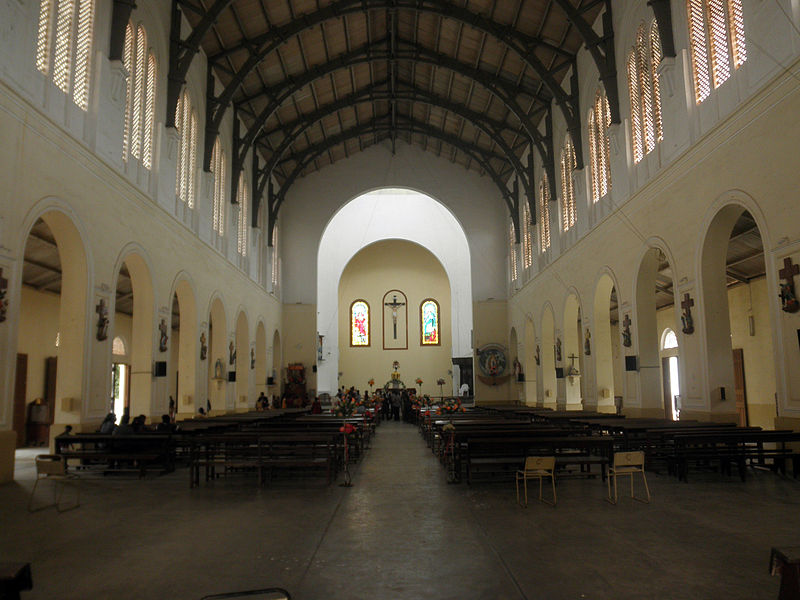
Thirugananasampanthar v Australia (CAT, 2017)
Violations: CAT art 22
 Unremedied
Unremedied
The UN says:
CAT (2017)The Committee urges [Australia] to take steps to prevent similar violations of article 22 in the future and to ensure that, in cases where the Committee has requested interim measures, the complainants are not deported until the Committee has decided on the merits.

St Mary's Cathedral in Jaffna, where Mr Thirugnanasampanthar took refuge for over a year in 2009-11.
Subakaran R. Thirugananasampanthar is a Tamil Sri Lankan who, at the age of about 15, was filmed and photographed as a lead actor in a school play organised by the Liberation Tigers of Tamil Eelam (LTTE) during a ceasefire in the civil war in 2005. A couple of years later, 4 armed men came to his house to question him about the LTTE and attempted to abduct him. He stopped attending school and went to live with a relative. When armed soldiers and paramilitary gangs continued visiting his home, he went into hiding for over a year. When the visits became less frequent, he returned home. He was by now 20 years old.
A few months later, Sri Lankan soldiers came to his home, beat him and attempted to rape his 16-year-old sister. Shortly afterwards, he was accosted on the street by a large group of men and forced into a van. He was detained and tortured for 6 days. When his father paid a bribe for his release, the man he bribed said he would tell the others that Mr Thirugananasampanthar had escaped and warned that they would attempt to recapture him and kill him. He fled Sri Lanka, after which soldiers and armed gangs did go to his home again looking for him.
He arrived in Australia in 2011 and applied unsuccessfully for refugee protection.
He claimed that if he was returned to Sri Lanka, he would be abducted, tortured and likely killed by the Sri Lankan Army or paramilitary groups. He attested that of those who had participated in the same school play, about half had fled Sri Lanka and those who remained had been killed. He claimed that Australia would breach CAT article 3(1) (non-refoulement) if it deported him to Sri Lanka.
He appealed the decision to refuse him refugee protection, and while he had an appeal pending before the Federal Court, due to be heard in August 2014, immigration authorities informed him that he would be forcibly deported in June.
Mr Thirugananasampanthar petitioned the Committee Against Torture, and the Committee contacted the Australian Government the same day with interim measures, asking Australia to not deport him while his communication was before the Committee. The message allegedly did not get through to the relevant arm of government in time and, as Mr Thirugananasampanthar was scheduled to be deported the next day, the deportation proceeded, in breach of the interim measure (para. 1.2).
One consequence of his being deported prematurely was that Mr Thirugananasampanthar was unable to respond to Australia’s objections to his communication in the usual manner, which must place him at a disadvantage, compared with the usual exchange of evidence and rebuttal by both parties, “which prevented the Committee from considering [his] communication effectively” (para. 9).
Nonetheless, the Committee was satisfied that Australian authorities had given appropriate consideration of Mr Thirugananasampanthar’s claim and that he hadn’t demonstrated that his deportation to Sri Lanka would violate article 3.
However, as Australia had failed to comply with the Committee’s request for Mr Thirugananasampanthar not to be deported as an interim measure, it was found to have violated article 22 (States may recognise the competence of the Committee to receive communications from individuals). The Committee noted that interim measures are a “vital” part of its role under article 22 and that, “failure to respect the interim measure requested by the Committee, in particular by forcibly removing an alleged victim, undermines the protection of the rights enshrined in the Convention” (para. 6.1):
“Any State party that has made a declaration under article 22 (1) of the Convention ... implicitly undertake[s] to cooperate with the Committee in good faith by providing it with the means to examine the complaints submitted to it and, after such examination, to communicate its comments to the State party and the complainant. By failing to respect the request for interim measures transmitted to [Australia] on 24 June 2015, [Australia] seriously failed in its obligations under article 22 of the Convention, in particular as the removal of the complainant to Sri Lanka hindered an effective examination of his complaint by the Committee” (para. 6.3).
The Committee did not seek individual remedies for Mr Thirugananasampanthar, but recommended non-repetition measures.
A dissenting opinion by a single Committee member argued that a breach of the interim measures rule was not tantamount to a breach of article 22 (unlike interim measures for CEDAW, CRPD, CPED & the ICCPR, which are binding on parties to the optional protocols).
Australia claimed that while Mr Thirugananasampanthar was in transit between Australia and Sri Lanka, accompanied by 2 Australian immigration officials, unspecified Australian authorities read his communication to the Torture Committee and determined that it contained no new information that had not already been considered by Australia.
Australia noted that Mr Thirugananasampanthar was interviewed by police at the airport on his arrival in Colombo, but was allowed to leave the airport and was met by his brother. After that, Mr Thirugananasampanthar could not be contacted by the Federal Court of Australia (para. 4.8), or the UN Committee Against Torture (para. 6.2) or by his own lawyer in Sydney (para. 5).
The Australian Government does not appear to have responded to the Committee' final views.
Read the full decision: Thirugananasampanthar v Australia (August 2017)

Australia deported Mr Thirugnanasampanthar while he still had an appeal pending before the Federal Court of Australia (pictured). Once deported, neither the Court, nor his lawyer, was able to contact him.